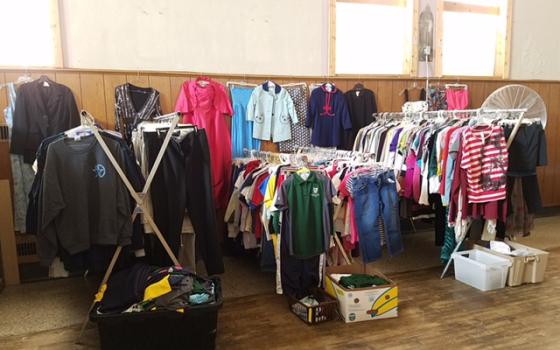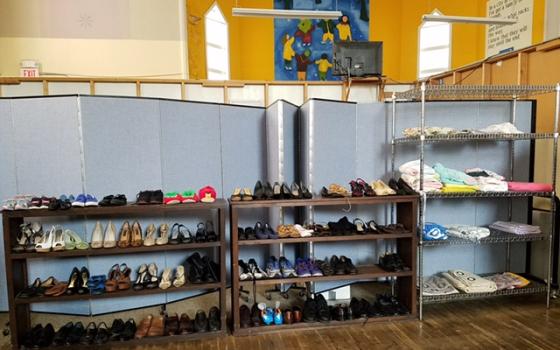I almost missed her as I walked by. But then, she called out to me and said, "I'm back. I am getting it together now." Gemma was a regular at our neighborhood food pantry. Since customers could start coming twice a month, it was not unusual to see Gemma sitting in the waiting room or frequenting our clothing closet. Bright, cheery and full of energy, Gemma was hard to miss. She always had a hug and a smile ready. She wanted to know about you.
At the beginning of this year, our food pantry started bringing coffee and sandwiches to places on the streets where homeless people would gather during the day. Gemma was also always there too. She was never shy with her compliments on how good our coffee was and what an afternoon treat the sandwich made.
On these visits, Gemma started talking about making changes. She wanted something different. She was tired of the gruesome routine of her life. Each week, we saw less and less of her. She was choosing new hangouts and working at the tough spots of life. When we did see each other, our conversations were centered upon the newness in her daily routine. She even spoke of studying the computer and spending more time taking care of her health.
Then, all of a sudden, she was gone. She stopped coming all together to both the food pantry and the street hangouts. I was encouraged. I was full of optimism and hope for Gemma. So, when one of the clothing closet volunteers told me that Gemma was here and had just stuffed clothes into her bag instead of paying the nominal fee for each item, I thought for sure they had the wrong person. But, there she was, caught in the act. Trying to preserve her dignity, I called Gemma aside, emptied the content of her bag, and simply told her she needed to go
Go she did. She stayed away several months. I thought about Gemma often. I missed her spirit and prayed for her health and healing. I asked God to give her whatever she needed to reach wholeness. I asked God to protect her.
Then, there she was again, sitting in the waiting room, with that priceless smile and good nature. She rose to hug me. In the mini-second it took me to recognize Gemma, I also began wondering if I should be the manager of the food pantry or Sr. Peggy Ryan, OP. Should I recognize the friend in front of me or the person who attempted to steal from our clothing closet?
Gemma must have registered my doubt. She immediately said, "It is okay, I will leave." My silence filled the room. It was deafening. It lasted seconds, but it felt much longer. I physically turned my body around. I made a complete circle and then looked Gemma right in the eye and said, "You do not need to go anywhere, Gemma. Everyone deserves a second chance." She started to explain her decision to come back to the pantry. She talked about her need and her shame. She apologized and repeated to me that she is at a much better place now.
Gemma's relationship has made me think so much in the past months about the Gospel call to accompaniment. When we are called to accompany others, to walk with as Christ walked with, we often find ourselves at an intersection where difference and sameness meet. When we are offered the opportunity to truly enter into another's life, we usually end up discovering not only what separates us, but also how much we each have in common. To accompany with authenticity requires that we each stay in touch with our own need for mercy and for love.
Cecilia González-Andrieu, the Latina theologian, calls this encounter "a place of paradox," where we experience both "radical otherness" and radical interconnectedness." As a young woman, on location in Israel with a film crew, González-Andrieu saw in a pre-dawn seating the silhouette of a lone woman collecting water. In that moment, she experienced a deep kinship with her, and the complete otherness of her own life:
"It is not easy to describe what I felt at that moment, but the beauty of the scene caused a mix of identification with her, a knowing inside of our deep and abiding kinship, of our familial ties, and at the same time a foreboding at what I suddenly realized was the radical otherness of my life. I was in danger of forgetting the wonder of greeting the dawn and the precariousness of water and the purposeful walk of someone whose 'work of human hands,' to quote the Catholic liturgy, was truly needed."
Like González-Andrieu, this encounter with Gemma called me to identification. In Gemma's behavior, I had to be willing to see myself. What power over me, like the power addiction has over Gemma, makes me do something "wrong"? Is it my need to look good or my need to be in control? Our encounter on that cold February day in the food pantry told me how much we need each other. How else would we be reminded of the beauty of offering each other the hand of friendship or the grace that comes in forgiveness? How else would we be reminded of God's presence and love?
I really like the way the well-known Jesuit, Greg Boyle, who has entered into the gang life of Los Angeles says it: "I discovered that you do not go to the margins to rescue anyone. But if we go there, everyone finds rescue."
The call to accompaniment continually requires significant inner work. Letting go of ego, opening ourselves up to the other, and most importantly, doing the spiritual work that offers us the great gift of staying grounded in God's love, mercy, and joy demands a discipline and a commitment to prayer and truthfulness. We have to be willing to name our fears and work at transformation. And, at that intersection of difference and sameness, where Gemma and I met, are the purest gifts of beauty and encounter. Accompaniment brings all of us to wholeness.
[Peggy Ryan is a Dominican Sister of Sinsinawa who recently completed her Doctor of Ministry degree from Barry University in Miami Shores, Florida. As part of her parish ministry, Peggy and the other Dominican Sisters with whom she lives, offer weekend retreats of service and theological reflection.]


